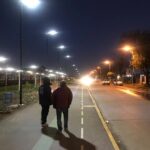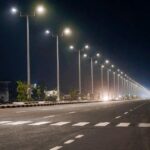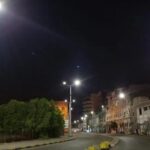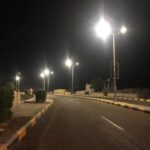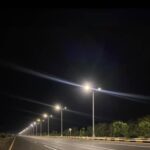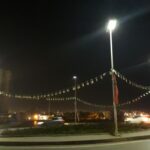Un certain nombre de différents types de contrôleurs utilisés dans le lampadaire solaire à LED circuit pour améliorer le fonctionnement du système ainsi que pour introduire une variété de fonctionnalités différentes. Les contrôleurs sont des appareils intelligents qui peuvent être programmés à l'aide d'applications logicielles afin de contrôler le fonctionnement du Rue LED lumière selon les exigences. Certains contrôleurs ont une plus grande hiérarchie de pouvoirs et peuvent contrôler le fonctionnement d'autres contrôleurs du système. D'autre part, il existe des contrôleurs secondaires qui sont utilisés pour ajouter diverses fonctionnalités alors qu'ils sont contrôlés par un contrôleur principal ayant la hiérarchie de puissance la plus élevée.
Dans un système d'éclairage public solaire typique doté de fonctionnalités d'intensité automatique, un contrôleur standard est utilisé, capable de contrôler l'intensité de la lumière en fonction des exigences de l'environnement. L'utilisation d'un contrôleur d'intensité automatique dans le circuit d'éclairage public solaire à LED est la plus courante dans l'industrie. Cependant, divers autres contrôleurs peuvent être ajoutés au système afin d'introduire de nouvelles fonctionnalités et d'améliorer le fonctionnement du système.
Par conséquent, dans cet article, nous discuterons des différents contrôleurs qui peuvent être ajoutés à un système pour améliorer le fonctionnement et ajouter des fonctionnalités. Ces contrôleurs ont été divisés en deux grands groupes, à savoir les contrôleurs primaires et les contrôleurs secondaires. L’explication des deux groupes est donnée ci-dessous :
Contrôleurs principaux
Les contrôleurs principaux sont principalement utilisés pour contrôler le fonctionnement global des lampadaires solaires et possèdent la hiérarchie de puissance la plus élevée du système. Les contrôleurs principaux sont généralement programmés via des applications informatiques et diverses instructions sont fournies afin de contrôler le fonctionnement du système en conséquence. Il existe deux principaux types de contrôleurs disponibles sur le marché, décrits ci-dessous :
- Microcontrôleurs: Un microcontrôleur est un circuit intégré capable d'exécuter des instructions qui ont été introduites dans sa mémoire et de mettre en œuvre des fonctionnalités conçues par les utilisateurs. Un microcontrôleur contient un processeur, une mémoire et des unités d'entrée/sortie (E/S) sur une seule puce, ce qui en fait un équipement très compact et intelligent. L'utilisation d'un microcontrôleur est courante dans le circuit d'éclairage public solaire à LED où il est utilisé pour contrôler d'autres composants du système et fournir diverses fonctionnalités.
- Microprocesseurs: Un microprocesseur est une puce logique, qui contient les fonctions de l'unité centrale de traitement (CPU) d'un ordinateur et est capable de mettre en œuvre des mécanismes de contrôle. Le microprocesseur est très efficace pour contrôler différentes parties des machines, transférer des données entre les périphériques d'entrée et de sortie (E/S) et décoder les instructions qui ont été introduites dans sa mémoire. Par conséquent, l’utilisation d’un microprocesseur comme contrôleur principal dans un circuit d’éclairage public peut s’avérer très efficace pour obtenir les résultats souhaités.
Contrôleurs secondaires
Les contrôleurs secondaires sont des dispositifs utilisés pour introduire différentes fonctionnalités du lampadaire solaire et améliorer son fonctionnement en fonction des besoins de l'utilisateur. Ces contrôleurs secondaires peuvent être prévus dans le circuit d'éclairage public solaire à LED et sont contrôlés par les contrôleurs primaires afin d'effectuer leur action. Dans la section ci-dessous, certains des contrôleurs secondaires les plus populaires utilisés dans les circuits d'éclairage public solaire ont été abordés :
- Gradateurs: Il s'agit d'un type de contrôleur utilisé dans un lampadaire solaire afin de réduire l'intensité de la lumière. L'utilisation de contrôleurs secondaires est très importante pour améliorer le fonctionnement du lampadaire et optimiser l'utilisation de la batterie.
- Contrôleurs LED RVB: Ces contrôleurs sont capables d'optimiser le spectre de sortie de couleur d'un lampadaire solaire à LED. Cependant, l'utilisation de ces contrôleurs dépend également des propriétés des LED utilisées dans le système. Ces contrôleurs peuvent optimiser le spectre de couleurs afin d’augmenter le rendement global et l’industrie de la lumière.
- Contrôleurs d'amplificateur de signal: Ces contrôleurs sont capables de contrôler l'entrée du signal fourni au lampadaire solaire et d'optimiser sa sortie en conséquence. De cette manière, l'intensité de sortie du lampadaire peut être optimisée et l'intensité souhaitée peut être obtenue en introduisant un contrôleur d'amplificateur de signal dans le circuit du lampadaire solaire à LED.
- Contrôleur LED Wi-Fi: Les contrôleurs de LED Wi-Fi sont capables de contrôler le fonctionnement des LED au moyen d'un signal Wi-Fi. De cette façon, le fonctionnement de la LED peut être facilement contrôlé via un contrôleur Wi-Fi à l'aide d'une télécommande et le recours au fonctionnement manuel sera éliminé.
Il existe divers autres contrôleurs secondaires qui peuvent être utilisés dans le circuit d'éclairage public solaire à LED afin de fournir diverses fonctionnalités en fonction des besoins des utilisateurs.
Circuit de lampadaire solaire à LED : Conclusion
Le microcontrôleur et le microprocesseur sont les deux contrôleurs principaux les plus importants utilisés pour optimiser le fonctionnement d'un système d'éclairage public solaire. Cependant, au fil du temps, divers autres contrôleurs ont été fabriqués, tels que Arduino, Raspberry Pi, etc. qui sont capables de contrôler les systèmes de manière efficace et d'offrir une plus grande flexibilité aux utilisateurs.
De même, de larges gammes de contrôleurs secondaires sont disponibles sur le marché, grâce auxquelles diverses fonctionnalités secondaires peuvent être introduites dans les systèmes et leurs performances globales peuvent être améliorées. Par conséquent, il est recommandé, lors de la conception d'un circuit d'éclairage public, d'effectuer une étude de marché à cet égard afin de déterminer les contrôleurs capables de répondre aux exigences de manière plus efficace et plus pratique.



